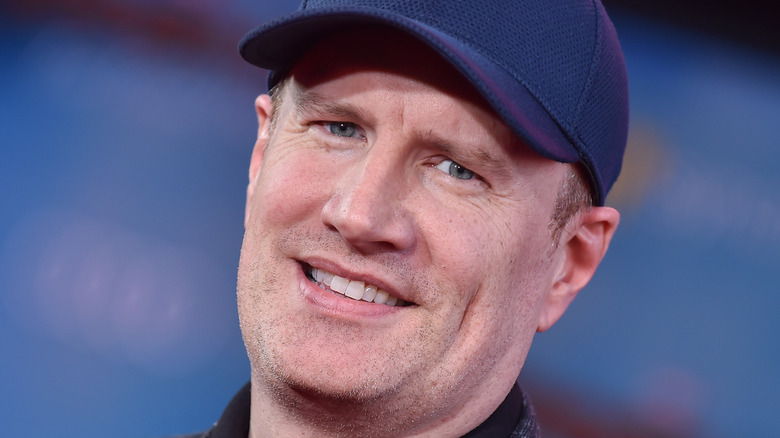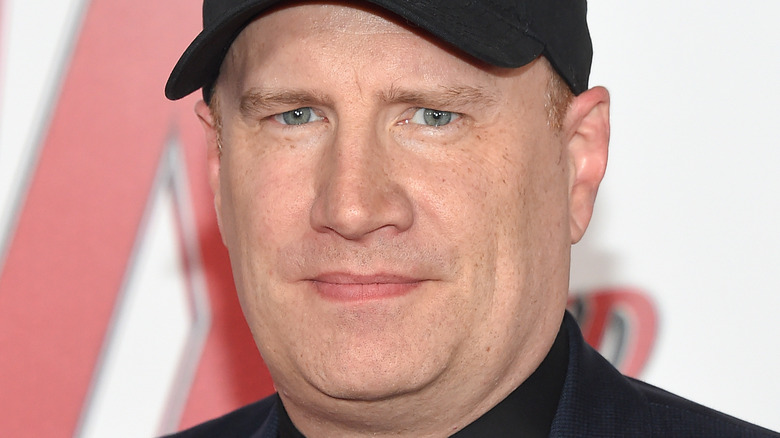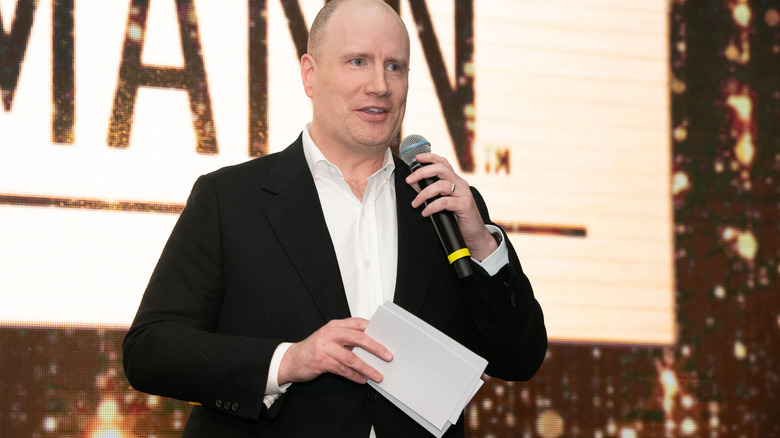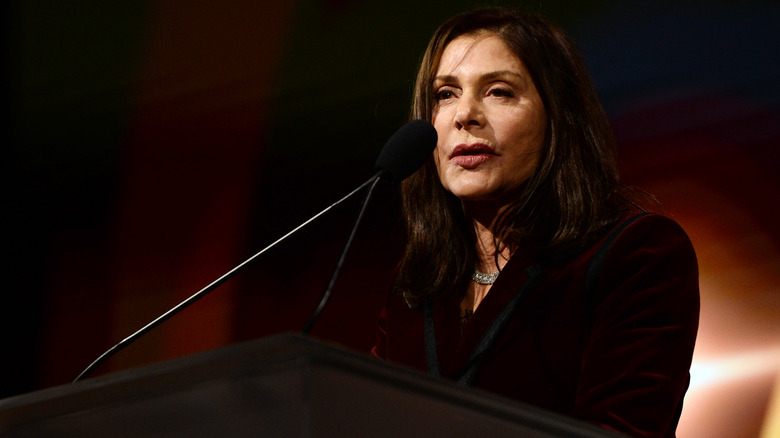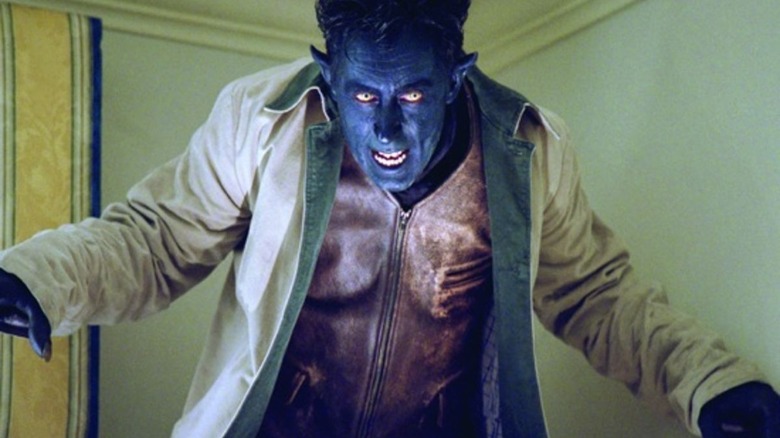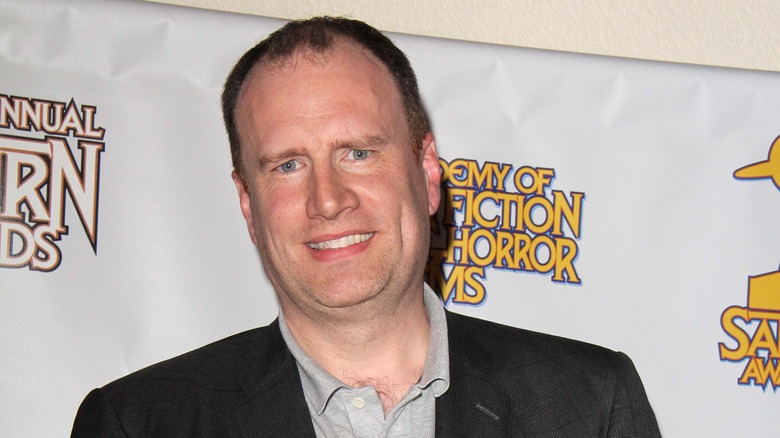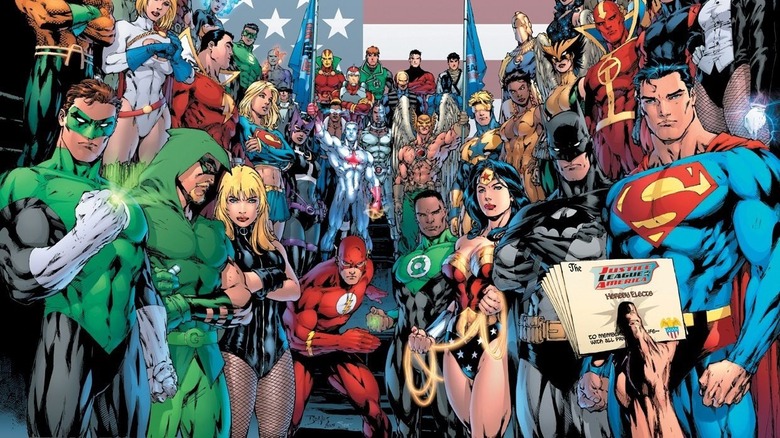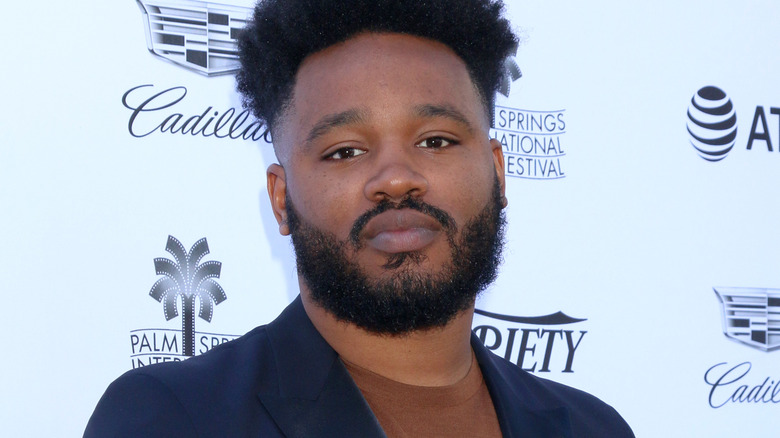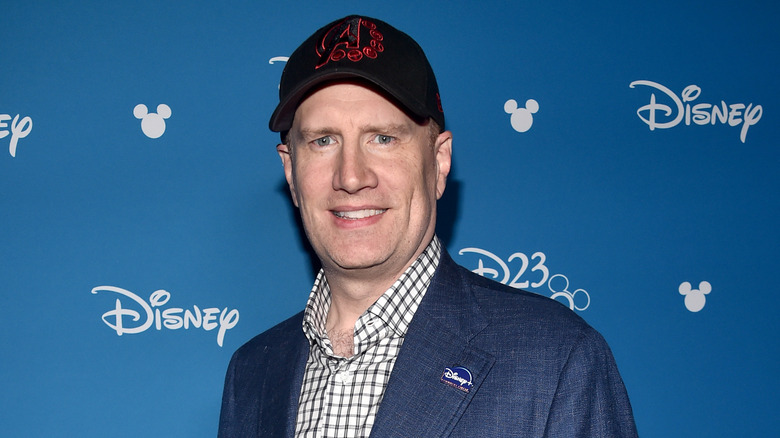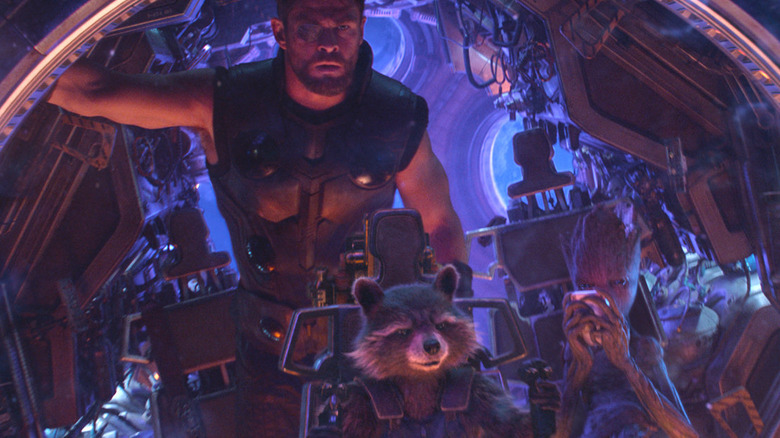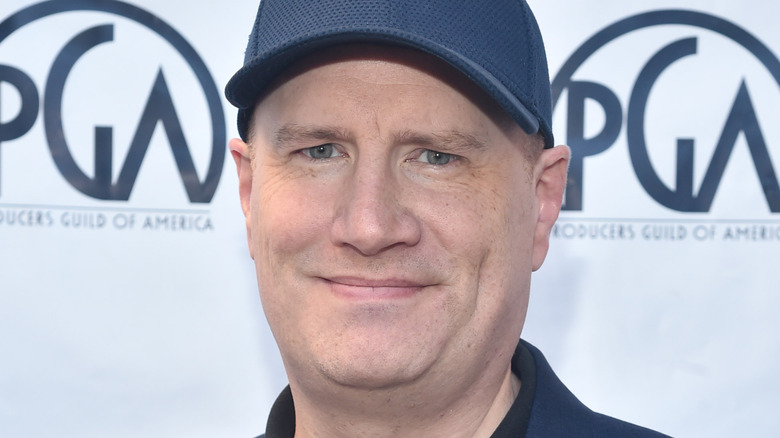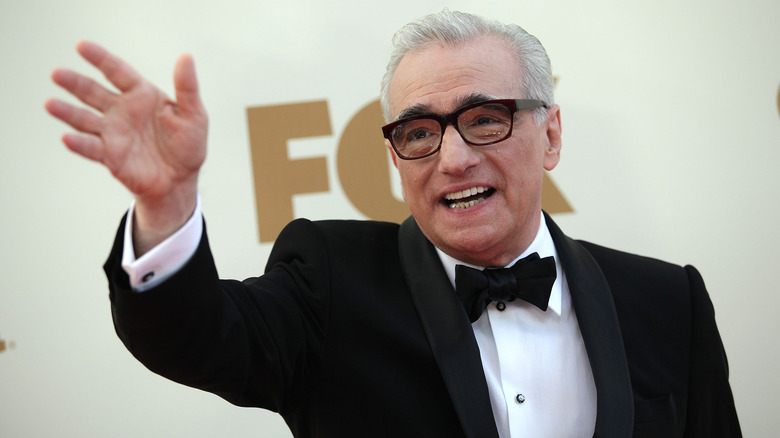The Untold Truth Of Kevin Feige
When people think of the Marvel Cinematic Universe, the first individual they associate with the franchise might be Robert Downey Jr., Tom Holland, or Scarlett Johansson. But if there's one person who truly represents the MCU — who's thoroughly intertwined with this massive media entity – it's Kevin Feige. The chief creative officer of Marvel Studios, Feige serves as a producer of all Marvel Studios titles and is a key creative person in shaping this elaborate multimedia narrative. He's also an individual who's had constant faith in Marvel Studios adapting lesser-known superheroes, such as Iron Man or the Guardians of the Galaxy, into super high-profile blockbusters. The result has allowed for a whole new crop of blockbuster protagonists to define a generation.
Feige's accomplishments on the screen are well-known at this point, but what's less well-known are his achievement off the silver screen. Who is Feige? Was he always fixated on comics? What are his thoughts on the finer details of the Marvel Cinematic Universe? If you want answers, then keep on reading to discover the untold truth of Kevin Feige, the person most deeply connected to the biggest film franchise in history.
Kevin Feige didn't grow up on comics
Today, Kevin Feige is seen as the master of comic book movies, a person who can turn any obscure Marvel property into a household name. So it can be startling to discover that Feige actually wasn't much of a comic book aficionado when he grew up. He had nothing against the artform though, far from it. It just wasn't where his adolescent passions lied.
"Comics were not high on there, actually," Feige explained to Vanity Fair, referring to the content he enjoyed growing up. "It was the kind of movies based on comics — like [Richard] Donner's 'Superman.' Later, when I was 16, Tim Burton's 'Batman' came out. But also the 'Star Wars' movies, the 'Star Trek' movies, the 'Indiana Jones' movies, the 'Back to the Future' movies, the Amblin movies. ... Those were the types of movies I loved. I always say, 'I was at the movie theater on Friday, but I only occasionally went to the comic-book shop on Wednesdays — which was new comic book day.'" Feige would then go on to note that one of his first loves in the world of superheroes was "X-Men," but even this was more spurred on by the Saturday morning cartoon than anything else.
However, even though young Feige wasn't initially enamored with the world of comic books, but it wouldn't be long before comics defined his life as an adult.
He was rejected from the University of Southern California ... a lot
Given all the success Feige has had with Marvel Studios, you'd probably expect him to have had similar nonstop victories with film-related pursuits all throughout his life. But believe it or not, it hasn't always been roses when it comes to cinematic matters for Feige. Most notably, this iconic producer was constantly struggling to get into University of Southern California's film program.
"I was rejected from the film school many, many times," Feige reflected in 2017 to Vanity Fair. "I got into the university with the early-admissions first application, beginning of my senior year. The film school — rejection. Five times. Five or six times. I applied every semester, basically, until I got in. There was a point where I thought, 'Oh, I'm just not getting in, so I'll have to go figure out another major.' At no point did I go, 'I have to figure out another career.' I always wanted to keep heading towards movies."
With enough persistence, Feige managed to get in, a feat as heroic as anything accomplished by Spider-Man or Captain Marvel. Over time, Feige wouldn't just graduate from this program, he would even leave a lasting mark on the institution through establishing the Kevin Feige Fund for Endowed Creativity at USC in 2017.
Feige's mentor was a key player in superhero history
Everybody needs a mentor. Nobody starts out as being a master in their field. The same is true of Kevin Feige, who, early on in his career, didn't just study under any veteran film industry person, he learned the tricks of the trade from a producer who was handling a series of superhero movies. Producer Lauren Shuler Donner, a figure responsible for shepherding films ranging from "Maverick" to "Free Willy," was a formative person for Feige, and her impact on him would reverberate for decades to come. Specifically, this was because Donner was initially the person in charge of producing the "X-Men" movies, and Feige worked right alongside her as Donner broke new ground for comic book movies.
"I started writing notes on the early drafts of X-Men that came in," Feige would later recall according to We Minored in Film, "and because Lauren is an amazing mentor and is so gracious, she would read the notes. Eventually, she started saying, 'Hey, come into the office and sit with me.' I would be sitting with Tom DeSanto, who's the producer of 'X-Men,' and Bryan Singer, who was the newly hired director, and I just started to become a part of that creative team." From there, Feige polished up the creative skills that he would later use at Marvel Studios. It's true that everybody needs a mentor, but few get one as helpful and encouraging as Feige did with Lauren Shuler Donner.
Feige learned valuable lessons from the X-Men movies
Kevin Feige's first foray into working on a superhero movie was on the initial "X-Men" films for 20th Century Fox. These live-action adaptations had their well-reviewed installments, as well as their widely reviled entries. However, on the earliest "X-Men" movies, Feige discovered some valuable lessons that he still clings to while running Marvel Studios.
When asked by Vanity Fair about important lessons he learned on early superhero movies, Feige recalled, "Watching that process on 'X-Men' and 'X2,' in particular, where the budgets were relatively limited and therefore you couldn't do everything we do nowadays in the films — you had to drill down on the characters. ... We keep that lesson nowadays, even when we do have resources to do whatever you want."
According to ScreenRant, these are also the movies where Feige learned the value of keeping the stories true to their beloved source material. Even though he was just a production assistant, he was key in keeping the characters grounded in their comic book roots. Through his experiences on these movies, Feige quickly learned that money can buy a lot of things, but it can't buy elements that have become ingrained into the iconic comics.
He believes Disney buying Marvel was a blessing
Just a few years into running Marvel Studios, Kevin Feige was hit with massive news. The company, as well as everything under the Marvel umbrella, had been bought by Disney. In other words, the 2009 transaction put this comic book entity under the ownership of the Mouse House. In the wake of this development, longtime superhero fans grew concerned that Marvel's storylines would become diluted under Disney ownership. Would Disney be ruining Marvel just as the company's cinematic universe was beginning to get off the ground?
Well, more than a decade after Disney ponied up the cash for Marvel, Feige has nothing but positive things to say about this media company union. "It was the greatest thing that ever happened to us," Feige explained to ComicBook.com, adding, "If Disney hadn't bought us, you wouldn't have seen the movies we've made since then. For sure. I just don't think it would have been possible." Similarly, websites like D23 have chronicled quotes from Feige talking about what a boon Disney+ has been for the franchise, another positive that wouldn't have been possible if another company had bought up Marvel. Rather than restricting Marvel's opportunities, Disney ownership seems to have opened up new doors for Feige and other higher-up's at the company.
Feige thinks the Marvel vs. DC rivalry is ridiculous
For as long as the two companies have been dominant on sales racks, there's always been a rivalry between Marvel Comics and DC Comics ... or at least one perceived by fans all around the planet. That concocted adversarial dynamic has only grown more intense as the two companies have increased in fame through the world of cinema. For his part, Kevin Feige thinks the whole concept of there being a Marvel vs. DC rivalry is overblown. In fact, in his eyes, it's outright preposterous.
"I think it's ridiculous," Feige said on the subject in 2017 according to SyFy. "I think movies are awesome, and people should go out and support awesome movies, and I go support those movies, and I thought 'Wonder Woman' was awesome. ... I guess people like rivalries, I guess? I don't know. But I'm seeing [then-chief creative officer of DC Entertainment] Geoff Johns in a couple weeks for dinner. We went to this [Richard] Donner event together. Dick's Superman is still the best archetype of superhero films. So yeah, just go see cool movies. What are you fighting about?"
Though this perception has long existed, Feige's words make it apparent the whole notion of a Marvel vs. DC feud is a fictitious as any of the colorful superheroes the companies have created.
How MCU filmmakers get on Feige's radar
Over time, Marvel Studios has hired quite the eclectic group of filmmakers to helm individual titles in its cinematic universe. Everyone from Cate Shortland to Jon Favreau has worked behind the camera on MCU projects. Considering the frequently unorthodox choices for filmmakers, it can lead you to wonder how exactly Feige chooses directors for individual movies or showrunners for Disney+ films.
Apparently, if a filmmaker wants to be considered by Marvel, the decision hinges on their previous works. "Do something that gets on our radar," Feige said to the New York Film Academy about the criteria for filmmakers grabbing his attention. "And it doesn't have to be a big giant movie. It can be a clever show."
Of course, that's not all that's involved with the process. After getting the big man's attention, then it's time to put down the camera and step inside an office for some facetime with Feige. As he put it, "Then we have a lot of meetings and see if we're on the same page creatively. See if you know that this is somebody we can spend day in and day out with for the next three years, which is important. But it really comes down to 'do something that makes a mark regardless of the scope of the size.' And that seems to showcase how clever you can be."
Returning to this criteria for choosing Marvel Studios filmmakers has proven quite handy for Feige and the immensely successful Marvel Cinematic Universe, leading to strong collaborations with the likes of Ryan Coogler, Taika Waititi, Jac Schaeffer, and Michael Waldron.
How Feige sees his role as a producer
The MCU movies share a lot more than just continuity. They also share Kevin Feige's presence as producer. Though he's sometimes been joined by additional people like Amy Pascal and Nate Moore, Feige has been the primary producer on every single movie released by Marvel Studios. In taking on this role, Feige has a very concrete viewe of what his obligations as a producer on.
"A producer does nothing and everything" Feige said (via NPR) about his responsibilities in 2018. "Nothing, in that we don't write, not directing, not sitting at the Avid — the editing machine — but working with all those people and collaborating with all those people. And at the end of the day, the job, I believe, of a creative producer is to see the project through from the initial idea." Feige taking on this kind of guiding hand through the assorted Marvel Cinematic Universe installments has certainly been a large reason for the saga taking on the kind of pop culture reputation it has today.
What Feige looks for in MCU characters
The expansive cast of the Marvel Universe is made up of all kinds of oddballs and weirdos, ranging from synthezoids to raccoons to frozen super soldiers. But when creating classic Marvel comics, people like Stan Lee and Jack Kirby were always conscious to balance out all the strangeness with discernible humanity. That's been a mixture the MCU has worked hard to retain, with much of that fusion coming from Feige's own insistence on what kind of qualities should be apparent in Marvel Cinematic Universe characters.
In 2018, Feige told NPR that the process of breaking down the stories of individual Marvel projects involves looking at the most stylized characters in each script and then trying "to find the humanity in them." As he went on to explain, "A lot of that is right there in the comics to pull from. But we start to find ourselves identifying with each one that we're making at the time because that's how we believe the audience will as well. .. We try to instill a little bit of ourselves in all of them, in the hopes that the audience will then see themselves on the screen."
As a result of emphasizing this quality, the Marvel Cinematic Universe has produced a boatload of characters that moviegoers can identify with, even when they're fighting gods and aliens ... or even if they're gods and aliens themselves.
He doesn't mind making movies under tight release dates
Not counting the bizarre year of 2020, MCU fans have grown accustomed to reliably expecting Marvel movies to arrive on their announced release dates. While certain titles have had to shift their dates, for the most part, these blockbusters make it to theaters right on time. That's exciting for fans, but it can, in theory, prove stressful for the artists making these movies. They know they have to sprint to make a date, which can sometimes be established before even the first draft of a script is finished.
But for Kevin Feige, it's no sweat have to make movies that must meet certain release dates. When speaking with Collider, Feige was asked about the possible problems of rushing to hit set-in-stone deadlines. His response? "Sure, there's always a risk [of racing against the clock]. That being said, every movie I've ever made has been made towards a release date, including the first 'Iron Man' and 'The Incredible Hulk.' That's part of the challenge and, I think, part of the fun. To know that you're not working on a script that might never be made and is not in eternal development hell but has a finish line. I actually find that creative juices start flowing in a very effective way when that's the case."
Feige has dubbed Scorsese's Marvel movie comments 'unfortunate'
In the fall of 2019, the media landscape went into a frenzy over a series of comments Martin Scorsese made about the MCU. Specifically, Scorsese had said the Marvel movies were "not cinema" and were more akin to "theme parks" than anything else. He added that the movies were hogging up space both in theaters and the general pop culture discourse, stealing the spotlight from what he perceived as "actual films." It was a series of opinions that drew a wide range of responses, including some comments from Kevin Feige.
"I think that's not true. I think it's unfortunate," Feige said (per The Hollywood Reporter) about the central thesis of Scorsese's comments. "I think myself and everyone who works on these movies loves cinema, loves movies, loves going to the movies, loves to watch a communal experience in a movie theater full of people." However, Feige would go on to note that he was fine with Scorsese having his own thoughts about modern films. "Everybody is entitled to their opinion," Feige emphasized. "Everyone is entitled to repeat that opinion. Everyone is entitled to write op-eds about that opinion, and I look forward to what will happen next. But in the meantime, we're going to keep making movies."
